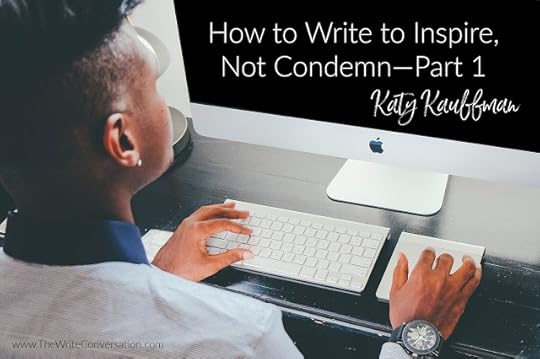How to Write to Inspire, Not Condemn—Part 1

by Katy Kauffman @KatyKauffman28
Sandpaper on my soul. As the sermon progressed, scratch … scratch … scratch. The words of the well-meaning pastor scratched against my heart. His condemning tone and harsh words caught me off guard. I wondered if this was a normal practice in the church I was visiting that day.
I know that the truth needs to be shared, but how should we share it? How does it make you feel when a stranger launches accusatory words your way? We can think about whether what they said applies to us. Regardless, we may wonder how that person could say such things without knowing us.
The same goes for writers and readers. It matters how we share the truth. What does God say about our actions?
One of my favorite Bible passages combines the sharpness that we need to stay alert in a world opposed to God’s ways, and the love that we need to operate in this world.
“Watch, stand fast in the faith, be brave, be strong.Let all that you do be done with love.”(1 Corinthians 16:13-14 NKJV)
Watch—know what’s going on in your community, your country, and the world. Stand fast in the faith—don’t give in to lies. Be brave—be courageous for God. Be strong—know what’s good and do it.
Because we care about people, we want to share the truth with them. Because God’s nature is made out of love, our writing can be guided by how love would turn a phrase and share a message.
How Can We Inspire without Condemning?
When we mirror God’s heart for His flock, we can write from a heart of love. Here are three ways we can inspire without having a condemning tone.
1. We can choose encouragement, not accusation.
If we can address problems with an encouraging tone, we are more likely to keep the reader with us. They will want to stick with it—to keep reading our article or book because we come to them with the heart of a friend. An encouraging voice can build a bridge into the reader’s heart, so our words are received with grace and openness. On the other hand, an accusatory tone can turn them off cold. Assuming our readers have certain problems can come across as condemning, and they may stop reading.
2. We can use words like “may” or “can” to give the reader some breathing room.
Our word choice can show we respect our readers. Use these kinds of phrases to begin a sentence that could otherwise sound condemning, and replace the parenthetical phrase with the struggle or consequences you’re addressing.“This can happen if we (persistent in a negative habit).”“We may have a tendency to (insist on our own way if we haven’t seen God working in our lives recently).”“We may find ourselves experiencing (this consequence for this sin if we don’t return to God’s path sooner than later).” Also, using “we” instead of “you” builds comradery with our readers and precludes an “I know you’re doing what’s wrong” tone in our writing.
3. We can show respect for our readers by including the “how” or “why” with the “what.”
“Do this because you should!” Did your mother ever say that to you? I have a mom who understood my need to know why, and she told me.
Show your readers what to do but also include why it’s beneficial and healthy. Follow up with how to accomplish it.
Which sentence would you prefer reading?“We need to spend time with God every day.” Okay, I know that. But why?
“When we spend time with God every day, we gain strength for that day’s challenges, direction for our decisions, and closeness to Him that refreshes our hearts.” Crafting encouragement rather than condemnation involves taking a look at God’s heart of compassion and learning from Him how to write the truth in love. Which of these three tips do you try to practice, and can you add any more? Join the conversation!
TWEETABLEHow to Write to Inspire, Not Condemn - Part 2 from @KatyKauffman28 on @EdieMelson (Click to Tweet)
 Katy Kauffman is an award-winning author, an editor of REFRESH BIBLE STUDY MAGAZINE, and a co-founder of LIGHTHOUSE BIBLE STUDIES. She loves connecting with writers and working alongside them in compilations, such as Feed Your Soul with the Word of God, Collection 1 which is a 2020 Selah Awards finalist.
Katy Kauffman is an award-winning author, an editor of REFRESH BIBLE STUDY MAGAZINE, and a co-founder of LIGHTHOUSE BIBLE STUDIES. She loves connecting with writers and working alongside them in compilations, such as Feed Your Soul with the Word of God, Collection 1 which is a 2020 Selah Awards finalist.In addition to online magazines, Katy’s writing can be found at CBN.COM, thoughts-about-God.com, and three blogs on writing. She loves to spend time with family and friends, talk about art and crafts in her group MY ARTSY TRIBE, and tend the garden in the morning sun. She makes her home in a cozy suburb of Atlanta, Georgia. Connect with her at her blog, WINNING THE VICTORY, and on FACEBOOK and TWITTER.
Published on February 15, 2022 22:00
No comments have been added yet.



